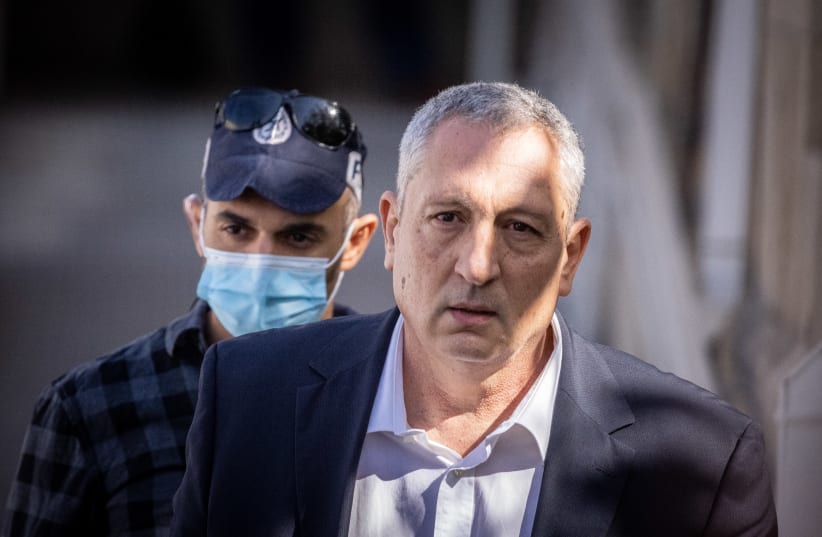Star witness Nir Hefetz provided the state prosecution with “the goods” in his evidence against former prime minister Benjamin Netanyahu, and yet could still torpedo the case.
On the plus side for the prosecution, Hefetz has provided detail and perspective into Netanyahu’s alleged media bribery actions.
On the negative side, he has not only tried to frame some of his and Netanyahu’s actions as unethical perhaps but not criminal, he has also been lashing out at the credibility of other key prosecution witnesses.
Why is Hefetz doing this, and how can he do it without violating his immunity deal as a state’s witness to cooperate with the prosecution?
Hefetz is not playing a one-dimensional game, but one with multiple dimensions.
For the prosecution, he needed to confirm their narrative about Netanyahu’s alleged actions to try to control news coverage at the Walla news site.
But Hefetz also has his own personal reputation that he hopes to rehabilitate both as a public figure who cares about his legacy generally, as well as to improve his chances as a public relations consultant in the future.
As long as he does not retract accusations against Netanyahu related to Walla, the rest of what he has to say – especially when cross-examined by the defense – is fair game.
So he has gone after key prosecution witnesses: former Walla CEO Ilan Yeshua, and former Communications Ministry director-general Avi Berger.
Hefetz testified on Monday that Yeshua was a serial liar. One instance involved an interview that Netanyahu gave to Walla’s Dov Gil Har.
Part of the controversy surrounding the interview involved claims by Netanyahu and Hefetz that they had made an arrangement with Walla about Gil Har not interrupting Netanyahu mid-answer.
When Gil Har interrupted Netanyahu anyway, the former prime minister was livid and tried to get Hefetz to get Walla to stop using the interview.
Earlier in the public corruption trial, Yeshua testified that he was not part of any arrangement with Hefetz regarding Gil Har not interrupting Netanyahu.
“I had discussions with both [Bezeq and Walla owner Shaul] Elovitch and Yeshua, and the arrangement was made with him,” Hefetz said on Monday. “To the extent that Yeshua says he did not know – that is a lie, period.”
IN ANOTHER instance, the defense found that Yeshua had promised Hefetz to post an item requested by Netanyahu, which he then did not post.
Hefetz expressed surprise, inferring again that Yeshua had acted dishonestly, tying in his repeated mantra that Yeshua was not someone who could be counted on to be truthful, and that he preferred to minimize contact with him.
In addition, this entire line of questioning exposed that some of the prosecution’s 315 incidents in which it asserted Netanyahu controlled coverage were based on text messages and finding something related online, but not necessarily an ironclad online check in each case.
This followed earlier testimony by Hefetz that Berger pleaded with him pathetically to tell Netanyahu that he would remain loyal to anything the former prime minister wanted, if only he allowed him to remain director-general of the ministry.
As with Yeshua, Hefetz said he never passed this on to Netanyahu, as he did not view Berger as trustworthy or someone who could be relied on.
According to Hefetz, Berger only truly turned against Netanyahu and the former prime minister’s alleged desire to favor Elovitch’s Bezeq telecommunications giant after Berger unofficially read between the lines that his days as director-general were numbered.
Why do we care what Hefetz thinks of Yeshua and Berger?
Because both Yeshua and Berger are key to the prosecution’s case against Netanyahu.
Having its star witness declare its other key witnesses as liars and non-credible is not the prosecution’s recipe for winning.
If even the prosecution’s star witness does not view Yeshua and Berger as credible, why should the court believe their respective accusations against Netanyahu for alleged illegal actions with Walla and with Bezeq in the different pieces of the media bribery scheme?
None of this means the prosecution is down and out.
When Judge David Rozen convicted former prime minister Ehud Olmert in the Holyland Affair, he selectively accepted certain pieces of witnesses’ testimony, even as he discarded other pieces.
This would be the prosecution’s hope: That the court will see Hefetz’s accusations against Netanyahu as the truth, enforced by a deal demanding the truth, but that his attacks on other witnesses are motivated by self-indulgence or interpersonal hatreds, with no tool to force him to be truthful.
While the prosecution’s hopeful scenario could play out, there is no question that Hefetz’s potshots on its other witnesses have created a whole new headache for its case.

